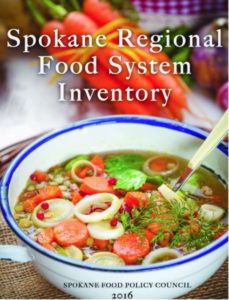By Spokane Food Policy Council member Elizabeth L. Abbey, PhD, RDN, CDN,
Assistant Professor, Whitworth University
 What does food mean to you? I ask my students to journal on this question during the first week of Nutrition. Their responses range from “fuel” (those are usually the athletes) to “comfort” to “the enemy”. Everyone has some relationship with food, and it varies over the course of our lives, and sometimes it is healthier than others. My students tend to struggle with this question. Coming up with a definition for a “healthy diet” seems to be much easier for them. When asked to define “healthy eating”, the Sunday school answer I hear back is “fruits and vegetables”. In a Christian Sunday school, the answer is usually “Jesus”. In Nutrition class, just say “fruits and vegetables”. These are college students, however, so some of their answers are more nuanced including words and phrases like “moderation”, “enough food to meet your energy needs”, “no sugar”, or “limited processed foods”. Besides telling me that they should be eating more fruits and vegetables, most of the language used tends to focus on weight management and what not to eat. The goal of all of this being to reverse or prevent obesity and chronic diseases. Talk about a real downer.
What does food mean to you? I ask my students to journal on this question during the first week of Nutrition. Their responses range from “fuel” (those are usually the athletes) to “comfort” to “the enemy”. Everyone has some relationship with food, and it varies over the course of our lives, and sometimes it is healthier than others. My students tend to struggle with this question. Coming up with a definition for a “healthy diet” seems to be much easier for them. When asked to define “healthy eating”, the Sunday school answer I hear back is “fruits and vegetables”. In a Christian Sunday school, the answer is usually “Jesus”. In Nutrition class, just say “fruits and vegetables”. These are college students, however, so some of their answers are more nuanced including words and phrases like “moderation”, “enough food to meet your energy needs”, “no sugar”, or “limited processed foods”. Besides telling me that they should be eating more fruits and vegetables, most of the language used tends to focus on weight management and what not to eat. The goal of all of this being to reverse or prevent obesity and chronic diseases. Talk about a real downer.
This is the message that we are told all the time by nutrition experts, health care professionals, researchers, government agencies, and the self-taught nutrition gurus online. This message is also clearly seen in the five overarching guidelines of the 2015 – 2020 Dietary Guidelines for Americans:
- Follow a healthy eating pattern across the lifespan. All food and beverage choices matter. Choose a healthy eating pattern at an appropriate calorie level to help achieve and maintain a healthy body weight, support nutrient adequacy, and reduce the risk of chronic disease.
- Focus on variety, nutrient density, and amount. To meet nutrient needs within calorie limits, choose a variety of nutrient-dense foods across and within all food groups in recommended amounts.
- Limit calories from added sugars and saturated fats and reduce sodium intake. Consume an eating pattern low in added sugars, saturated fats, and sodium. Cut back on foods and beverages higher in these components to amounts that fit within healthy eating patterns.
- Shift to healthier food and beverage choices. Choose nutrient-dense foods and beverages across and within all food groups in place of less healthy choices. Consider cultural and personal preferences to make these shifts easier to accomplish and maintain.
- Support healthy eating patterns for all. Everyone has a role in helping to create and support healthy eating patterns in multiple settings nationwide, from home to school to work to communities.
Do you see anything missing? Granted, the Dietary Guidelines is a 144-page document, that takes several minutes to download, and contains much more detail than these five points above. Within those 144 pages, however, there is only one mention of helping Americans adopt healthier eating patterns and making healthy choices “while enjoying food and celebrating cultural and personal traditions through food” (page vii). Americans have a complicated relationship with food, and the flood of information, flip-flopping recommendations (Eggs are good! No, eggs are bad!) doesn’t help. What would it look like for policy makers to make the enjoyment of food (e.g. growing, cooking, and eating) the primary target?
This could take many different forms, but one evidence-based practice would be to expand opportunities for culinary skill development and gardening for kids. There is evidence that the more exposed kids are to growing and preparing food, the more likely they are to eat it and develop a positive attitude towards it (see reference list below). This may include policies on new school design (designated garden and kitchen space), funding for new or existing programs (e.g. Family and Consumer Sciences Education), enhancing current educational requirements by integrating these skills into existing class content. Schools aren’t the only arena that could make hands-on food experiences a policy priority—after-school programs, faith-based organizations, private foundations, etc. could all get on board.
Finally, individual citizens can also have a voice in shaping the national conversation. The USDA and the Department of Health and Human Services are currently drafting the 2020 – 2025 Dietary Guidelines for Americans and are accepting public comments. Reducing healthy eating to a message of only weight management and avoidance is not a successful long-term strategy. Instead, let’s make the enjoyment of food a policy goal that we can all get behind.
References:
Allirot, X., da Quinta, N., Chokupermal, K., & Urdaneta, E. (2016). Involving children in cooking activities: A potential strategy for directing food choices toward novel foods containing vegetables. Appetite, 103, 275–285.
Evans, A., Ranjit, N., Rutledge, R., Medina, J., Jennings, R., Smiley, A., … Hoelscher, D. (2012). Exposure to multiple components of a garden-based intervention for middle school students increases fruit and vegetable consumption. Health Promotion Practice, 13(5), 608–616.
Gibbs, L., Staiger, P. K., Johnson, B., Block, K., Macfarlane, S., Gold, L., … Ukoumunne, O. (2013). Expanding children’s food experiences: the impact of a school-based kitchen garden program. Journal Of Nutrition Education And Behavior, 45(2), 137–146.
Muzaffar, H., Metcalfe, J. J., & Fiese, B. (2018). Narrative Review of Culinary Interventions with Children in Schools to Promote Healthy Eating: Directions for Future Research and Practice. Current Developments In Nutrition, 2(6), nzy016.


